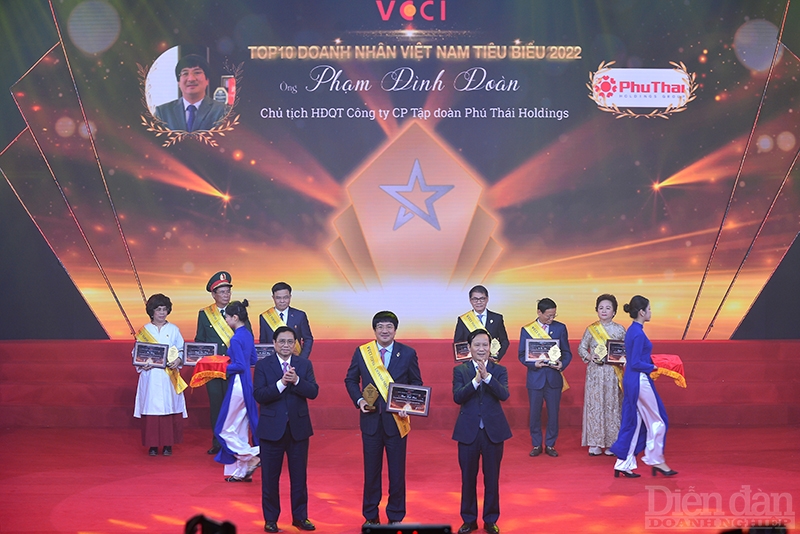Entrepreneurs create Vietnamese values
Entrepreneurs have increasingly expressed their roles in advancing industrialization, modernization, and national competitiveness improvement, accelerating integration and creating Vietnamese brand values.

Prime Minister Pham Minh Chinh and VCCI President Pham Tan Cong presented certificates and trophies to Mr. Pham Dinh Doan, Chairman of the Board of Directors of Phu Thai Group that is in the TOP 10 oustanding Vietnamese entrepreneurs in 2022.
A great resource for national development
According to the Vietnam Chamber of Commerce and Industry (VCCI), as of December 31, 2021, Vietnam had nearly 860,000 active enterprises, 15,300 non-agricultural cooperatives and 5.1 million smallholder business households (of which 1.6 million households have tax codes). The number of entrepreneurs reaches millions.
Vietnamese enterprises and entrepreneurs importantly help mobilize social resources for socio-economic growth. Specifically, the domestic business sector currently contributes 68% of the nation's GDP and over 70% of budget revenue, employs 10.2 million workers, and generates nearly 30% of the export value.
Their roles have been expressed more clearly as they have joined hands with the whole country to overcome the COVID-19 pandemic in the past two years.
As a large conglomerate in Vietnam, Vingroup has actively built laboratories, and linked and transferred vaccine technology regarding the COVID-19 pandemic virus for domestic production and supply.
In addition, Vingroup supported medical equipment such as ventilators and test kits worth thousands of billions of Vietnamese dong for the epidemic prevention force.
Masan, a top retailer and manufacturer of consumer goods, not only provided machinery, equipment and money, but also acted as a "front-line force against the epidemic" when it maintained operations of its WinMart/Winmart convenience stores during lockdown times to provide essential goods to people.
TH Group and GELEXIMCO are among the other prominent contributors to the COVID-19 pandemic containment.
Preliminary statistics showed that more than 70% of the COVID-19 Vaccine Fund resources called for by the Government came from entrepreneurs and businesses.
Joint effort to create Vietnamese values
Entrepreneurs have confronted numerous difficulties due to the pandemic consequences such as uneven economic recovery programs among countries, global supply chain disruptions and the Russia-Ukraine conflict. However, they have now entered the new normal period, and many of them have resumed their pre-COVID-19 growth levels.
Despite lots of challenges in 2021, Vietnam still had six billionaires on the Forbes list.
Entrepreneurs have worked to develop Vietnamese-branded value chains.
According to statistics, 124 companies have developed 283 national brand products, with some being very successful in regional and international markets such as Viettel, Vinamilk, VinFast, Thaco, TH True Milk and ST25 rice.
With a long-term strategy and vision, large domestic corporations have been gradually creating Vietnamese values in many fields. These values are not only limit ed to individual products, but also an ecosystem development strategy.
Vingroup is the most obvious and typical example. It is nowadays often joked: “Born in Vinmec, staying in VinHomes, driving a VinFast car, shopping at Vinmart and studying at Vinschool”, showing an inclusive ecosystem of VinGroup that creates new values for Vietnamese people.
Masan, with the acquisition of Vincommerce chain and VinEco's research laboratories or a series of other Vietnamese brands such as Phuc Long and Mobicast, is also building its own ecosystem of pure Vietnamese consumer goods.
Thaco also poured a very big amount of money to build automobile research and manufacturing factories, aiming to make Vietnamese automobiles for Vietnamese people.
Some tech firms like FPT or CMC, with their strengths in research and invention, own many "Made in Vietnam" patents which are recognized by the world. They also have globalization strategies, with CMC opening its branch in Japan or FPT signing technology supply contracts with foreign countries.
Commonly, they are all private enterprises, or in other words, companies are operated by the will of their leaders.
Some state-owned enterprises, such as Viettel, are being operated and developed mainly by the board of directors and the executive board where entrepreneurs are given power and responsibility by the state.
Obviously, from that perspective, Vietnamese entrepreneurs are currently making ongoing efforts to create valuable Vietnamese brands to increase competitiveness, develop quickly and sustainably, and ensure independence and self-reliance of the economy, building and promoting the role of Vietnamese entrepreneurs in the period of accelerating industrialization, modernization and international integration.








